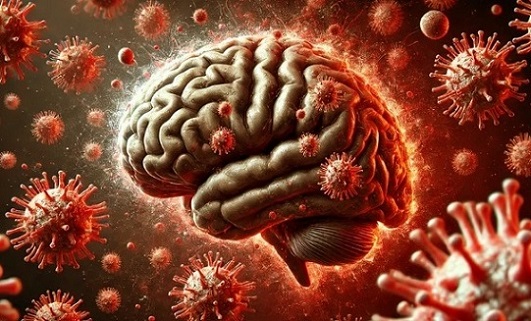American Study Finds That COVID-19 Accelerates Alzheimer Risk Through Brain Barrier Damage and Chronic Inflammation
Nikhil Prasad Fact checked by:Thailand Medical News Team Apr 21, 2025 3 hours, 43 minutes ago
Medical News: In a startling new medical review, researchers from Tulane National Primate Research Center and Tulane University School of Medicine in the United States have uncovered alarming similarities between the neurological damage caused by COVID-19 and the processes that drive Alzheimer’s disease. The study reveals that SARS-CoV-2, the virus responsible for COVID-19, shares several damaging pathways with Alzheimer’s—most notably, by disrupting the blood-brain barrier (BBB) and triggering chronic inflammation in the brain.
 American Study Finds That COVID-19 Accelerates Alzheimer Risk Through Brain Barrier Damage
American Study Finds That COVID-19 Accelerates Alzheimer Risk Through Brain Barrier Damage
and Chronic Inflammation
As the COVID-19 pandemic continues to leave a lasting mark on global health, more evidence has emerged that the virus does not simply attack the lungs but also causes deep and long-term harm to the brain. This
Medical News report delves into how COVID-19 may fast-track the development or worsening of Alzheimer’s disease, especially in older adults or those with existing vulnerabilities like obesity, high blood pressure, or diabetes.
The Common Denominator: Blood Brain Barrier Breakdown
The blood-brain barrier acts as a highly selective wall that protects the brain from harmful invaders and toxins in the bloodstream. When healthy, it ensures only necessary nutrients and molecules reach the brain. But in both COVID-19 and Alzheimer’s, researchers have found that this protective shield becomes damaged.
In COVID-19, intense systemic inflammation caused by the infection weakens the blood-brain barrier, allowing dangerous inflammatory molecules and immune cells to leak into the brain. In Alzheimer’s disease, this breakdown is more gradual, often worsened by aging and chronic inflammation. But the result is the same: once the barrier is compromised, a cascade of neurological damage begins.
The authors emphasize that even when the virus isn’t detected in the brain, the immune response it triggers is enough to cause damage. Autopsy studies and animal models have shown signs of microbleeds, brain cell death, and a pronounced inflammatory response—all of which can also be found in Alzheimer’s patients.
COVID Hijacks the Body’s Vascular Signaling System
One of the most crucial discoveries in the study involves the renin-angiotensin-aldosterone system (RAAS), which helps regulate blood pressure and vascular function. The virus hijacks this system by using the ACE2 enzyme—a key RAAS component—to enter human cells. This leads to a dangerous imbalance in the system, favoring inflammation and blood vessel damage.
In Alzheimer’s disease, although the mechanism is slightly different, a similar imbalance in RAAS is believed to fuel chronic inflammation in the brain. In both conditions, this inflammation causes further damage to the blood-brain barrier and reduces the brain's ability to clear out toxic prot
eins like amyloid beta, which are notorious for forming plaques in Alzheimer’s patients.
Wnt Beta Catenin Signaling Disrupted in Both Illnesses
The Wnt/β-catenin signaling pathway is essential for maintaining the structure and function of the blood-brain barrier. This pathway helps strengthen tight junctions between cells and prevents harmful substances from entering the brain.
In both COVID-19 and Alzheimer’s disease, this signaling system becomes disrupted. Mouse models and brain endothelial cell studies have shown that SARS-CoV-2 infection lowers the activity of this pathway, weakening the blood-brain barrier. Likewise, in Alzheimer’s models, reduced Wnt/β-catenin activity has been linked to increased brain inflammation and faster disease progression.
NFκB and Interferon Signaling Promote Dangerous Brain Inflammation
Another shared factor is the activation of the NFκB signaling pathway—a major driver of inflammation in the body. This pathway becomes highly activated in COVID-19 patients and Alzheimer’s sufferers, leading to the release of inflammatory cytokines that can cross into the brain and cause harm.
Interferon (IFN) signaling, especially type I and type II IFNs, also play conflicting roles. Type I IFNs (like IFN-β) may help protect the blood-brain barrier, while type II IFN (IFN-γ) appears to weaken it. Elevated IFN-γ levels, found in both COVID-19 and Alzheimer’s patients, further add to the breakdown of the barrier and the escalation of inflammation inside the brain.
Implications for Long COVID and Future Alzheimer Risk
The findings are particularly concerning for those experiencing Long COVID symptoms like brain fog and memory issues. The study strongly suggests that COVID-19 can set off a chain reaction of brain inflammation and vascular damage that mirrors the early stages of Alzheimer’s disease. This may explain why some patients report cognitive decline months after recovering from the initial infection.
Older adults and those with existing conditions that cause low-grade inflammation may be especially at risk. The combination of pre-existing vulnerability and SARS-CoV-2 infection could potentially push some individuals over the threshold into neurodegeneration.
Conclusions
This new review draws a clear line between the brain-related complications of COVID-19 and the biological underpinnings of Alzheimer’s disease. It shows that COVID-19 can accelerate or even initiate Alzheimer's-related damage by targeting the same cellular pathways and immune responses. The effects of the virus on the blood-brain barrier, inflammatory signaling, and brain immune cells like microglia all mirror the destructive processes seen in Alzheimer’s disease. As a result, people who have recovered from COVID-19—especially the elderly or those with other health issues—may face a greater risk of long-term neurological problems.
Understanding these shared mechanisms offers a vital opportunity to develop therapies that can prevent or reduce the impact of both conditions by targeting inflammation and protecting the blood-brain barrier.
The researchers involved in this critical review were Meredith G. Mayer and Tracy Fischer from the Tulane National Primate Research Center and the Department of Microbiology and Immunology at Tulane University School of Medicine in New Orleans, Louisiana, USA.
The study findings were published in the peer reviewed journal: The American Journal of Pathology.
https://www.sciencedirect.com/science/article/pii/S000294402500118X
For the latest COVID-19 News, keep on logging to Thailand
Medical News.
Read Also:
https://www.thailandmedical.news/news/australian-study-finds-that-those-with-post-covid-cognitive-issues-are-likely-to-suffer-from-blood-brain-barrier-disruption-and-glutamatergic-excitoto
https://www.thailandmedical.news/news/breaking-university-of-alabama-discovers-that-mild-covid-19-causes-brain-temperature-elevation-and-free-water-increases-in-the-brain
https://www.thailandmedical.news/news/new-study-links-covid-19-to-increased-risk-of-brain-degeneration
https://www.thailandmedical.news/articles/coronavirus
https://www.thailandmedical.news/pages/thailand_doctors_listings
https://www.thailandmedical.news/articles/hospital-news
